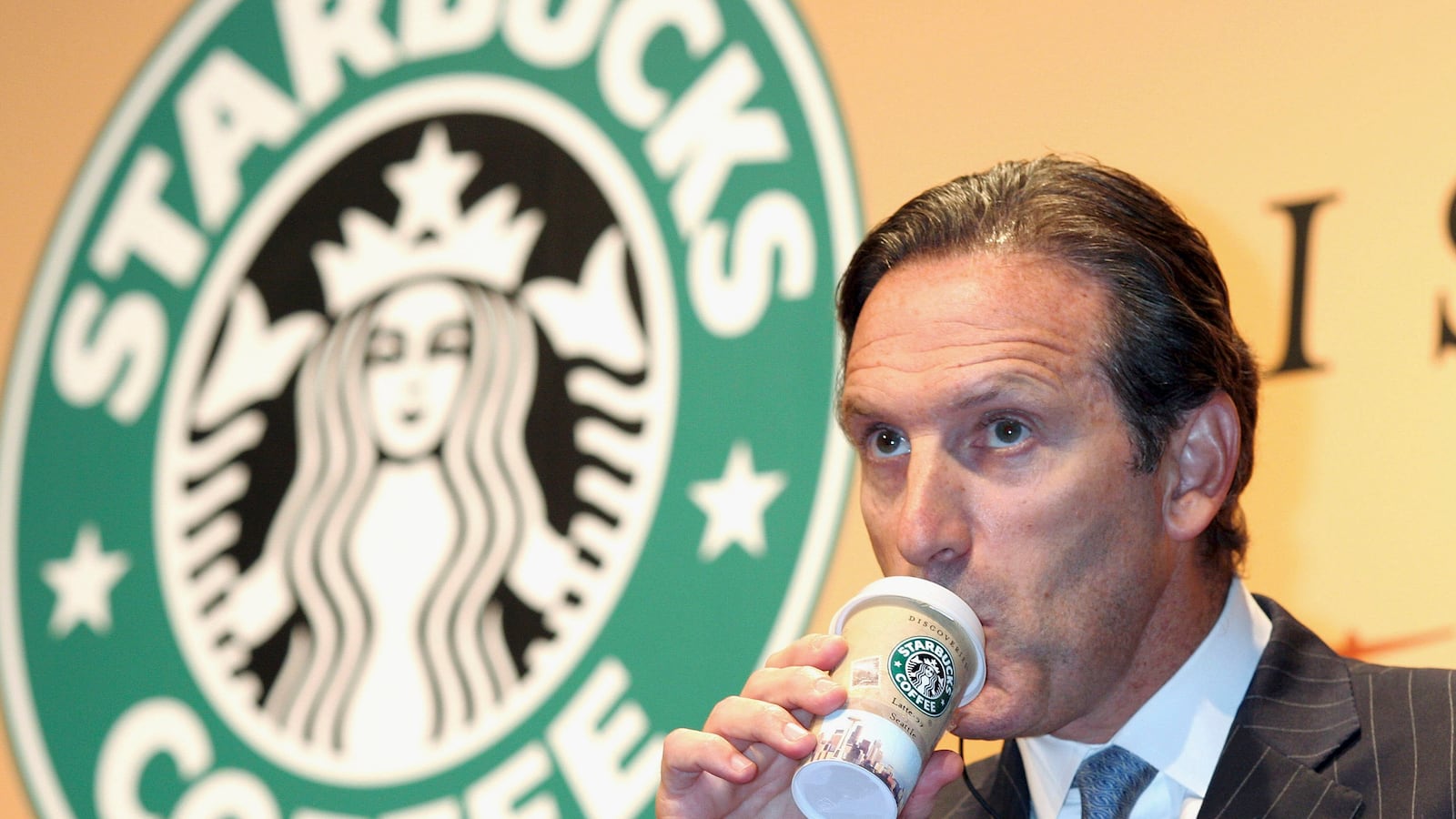For the record, I love Starbucks. I’ve got a Starbucks card in my wallet. I regularly wow bystanders by brandishing the Starbucks mobile payment app on my iPhone. At home, I start the day by scooping out a couple of heaping tablespoons of Starbucks espresso roast into my Breville machine.

But I was a bit dismayed by this morning’s news that Starbucks CEO Howard Schultz is spearheading a nonpartisan drive to jolt Washington into action. On the company’s home page there’s a plea to “our leaders in Washington, D.C.” to come together to reopen the government, pay our debts, and “pass a bipartisan and comprehensive long-term budget deal by the end of the year.”
That isn’t doppio. It’s dopey-yo.
Why is this annoying? Look, it isn’t D.C. leaders who have shut down the government and refuse to open it. It isn’t Washington that is blithely threatening not to meet our collective financial obligations. And it isn’t D.C. leaders who are refusing to enter negotiations about a longer-term budget deal. Rather, it’s Republicans behind all three. The debt-ceiling brinksmanship and government shutdown are pure Republican enterprises. Even professional centrists like Tom Friedman are acknowledging as much.
In the past couple of decades, there have been plenty of bad outcomes that Washington produced that were bipartisan: the Iraq War, the deregulation of the banking sector, letting Alan Greenspan run the Federal Reserve for 19 years. But the shutdown and the debt ceiling brinksmanship isn’t one of those outcomes.
Worse, the events were engineered, from the beginning—transparently and directly—by a group of people who identify themselves in opposition to Starbucks and everything it stands for. Senators Ted Cruz and Mike Lee identify with the Tea Party, not the Coffee Party. It is very common for conservatives to use “latte-sipping” as an epithet. Indeed, the very idea of Starbucks – the fair trade coffee, the emo acoustic music, the effete foreign offerings (vanilla scones? croissants?) – is much more attuned to liberal sensibilities than conservative ones. Starbucks may be a global corporation, and has a presence in every state. But it’s a blue-state company. It’s based in liberal Seattle, and thick in university towns, high-end suburbs and urban areas. According to the company’s store locator, Caspar, Wyoming, has three Starbucks stores. I’m pretty sure there are intersections in Manhattan that have more than that.
The disagreements carry over into policy. Starbucks believes in global warming and climate change; today’s Congressional Republicans, not so much. Last month, Starbucks told customers it would really, really prefer that they don’t bring weapons with them into company stores. Schultz has come out in favor of a higher minimum wage. He’s for same-sex marriage, and told stockholders who disapproved of his company’s stance that they should just sell their shares and move on.
Then there’s health care. It’s important to keep in mind that the proximate cause for the shutdown was the House GOP’s fierce, insane, inexplicable horror at the prospects of working-class people getting health insurance. Schultz himself has been a leader on healthcare. Part-time employees get health benefits. When the company struggled during the recession, he refused to cut benefits. Unlike many other CEOs at companies that rely on relatively low-wage workers, Schultz came out in August and said that the company would not reduce hours or benefits in response to the advent of Obamacare.
Yes, of course, Starbucks aims to serve everybody. So I don’t expect the company to ally itself publicly with Democrats and run attack ads on Republicans. But it should at least recognize reality. As the drama drags on, it is becoming increasingly clear to big business and Wall Street that the problem in Washington is the current Republican party, and the House Republicans in particular. It is becoming increasingly clear to the public as well. The devastating Wall Street Journal/NBC poll on Thursday shows the public overwhelmingly blaming Republicans for the crisis at hand.
You’d think that a company that is as savvy at marketing and gauging popular taste as Starbucks would understand that now is not the best time for a pox-on-both-houses message.





